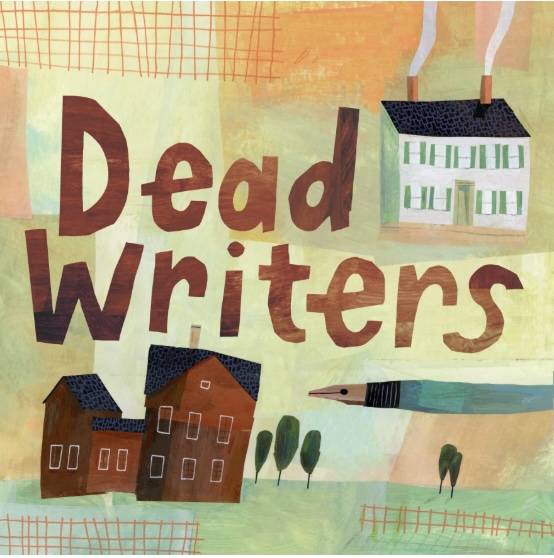“Dead Writers” podcast looks ahead to second season
February 21, 2025
 Courtesy of Mark Hoffmann
Courtesy of Mark HoffmannLast Saturday, a crowd of literary enthusiasts gathered in the entry pavilion of the Bowdoin College Museum of Art (BCMA) for a reception celebrating “Dead Writers,” a podcast created and hosted by Associate Professor of Africana Studies and English Tess Chakkalakal and Professor of English Brock Clarke. The reception marked a transition to the podcast’s much-anticipated second season, offering a reflection on the series’ development and a glimpse into what’s to come.
The podcast devoted its first season to exploring the homes of notable writers in Maine, including the residences of celebrated Bowdoin alumni Nathaniel Hawthorne and Henry Wadsworth Longfellow. Because the podcast is reliant on funding, Chakkalakal and Clarke do not have a solidified release date for the second season.
The timing of the reception aligned with the ongoing BCMA’s exhibition “Poetic Truths: Hawthorne, Longfellow, and American Visual Culture, 1840-1880,” the Department of Special Collections & Archives’ “Bowdoin College Class of 1825” project and the Longfellow Day’s festival, a month-long Brunswick tradition celebrating Longfellow’s February birthday.
What began as a Maine-focused first season will expand significantly in scope, with Chakkalakal and Clarke planning to venture across New England to explore the homes of literary giants and lesser-known writers alike. This expansion, however, depends on the podcast securing additional funding.
“[We’ll] be [talking about] Alcott and W.E.B. DuBois in Massachusetts. In Rhode Island, it’ll be H.P. Lovecraft, the horror writer. In Connecticut, it’ll be the James Merrill house…. And Bishop in Massachusetts, in Worcester,” Clarke said. “There are others, but that’s a sampling of them.”
The second season will be twelve episodes—twice as long as the first. “Dead Writers” is working with NPR affiliates, including Vermont Public Radio and WGBH in Boston, to share the podcast on air beyond Maine Public Radio. The podcast has already surpassed the scope Chakkalakal and Clarke initially expected.
“One of my former students who listens to it told me that the podcast is going to be really for a niche audience who are already maybe interested in those writers or already interested in American literature. But what I’ve been really surprised and happy to see is that it’s gotten a broader audience, [including] people who are just interested in the houses or road trips or traveling,” Chakkalakal said.
Chakkalakal hopes the show can reach more listeners from the Bowdoin community in the second season.
“Ideally, I would love for every single Bowdoin student to listen to the podcast, because it really is a Bowdoin production,” Chakkalakal said. “It’s not like a Bowdoin project, but we use the Bowdoin resources. We talk to Bowdoin students. Bowdoin students have helped us, and, of course, Brock and I are both teachers at Bowdoin.”
The podcast’s unscripted approach has resonated with listeners, as reception attendee Liz Armstrong, senior associate director of gift planning at the College, noted.
“I think it was really the banter between Tess and Brock that was fun, … [along with] them showing up at some houses without ever calling ahead, and people actually living in the houses and going, ‘I’m sorry, I’m on a conference call Zoom meeting,’ and slamming the door in their face,” Armstrong said.
Clarke explained that many of the stories about writers and their communities came from unexpected sources—from the neighbors next door to the waitress who worked down the street. Clarke looks forward to this spontaneity continuing in the second season.
“I’m interested in that kind of strange, unplanned moment,” Clarke said. “My hope is that we’ll have a lot more [of those] the more houses we go to, [and] we’ll have a lot more opportunities for those moments.”
Chakkalakal and Clarke are excited to continue improvising and utilizing the experience they gained from their first season.
“Nothing that we do should be scripted…. We’re much better when we’re just talking off the cuff,” Chakkalakal said. “Season one was a real experiment. We didn’t know at all what we were doing and what it would sound like. So, it’s kind of exciting with season two that we feel like we have some experience.”
As they look ahead to the expanded second season, both hosts see an opportunity to continue to learn from each other and discover the unexpected findings that emerge when they venture off the well-traveled literary path. For Clarke, this remains at the heart of the podcast.
“I like things that are sort of on the margins because then you get to write your own story,” Clarke said. “You don’t have to worry so much about the stories that have already been told.”

Comments
Before submitting a comment, please review our comment policy. Some key points from the policy: